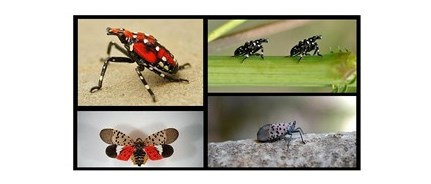Spotted Lanternfly Webinar
Spotted Lanternfly Webinar presented by Entomologist Kenton Sumpter
Event Details
This regulatory presentation on the Spotted Lantern Fly will be presented by Kenton Sumpter, Entomologist, Maryland Department of Agriculture. Information will be provided on the following topics:
- Lanternfly biology and history
- Why the lanternfly is a problem
- How the lanternfly spreads
- The national management effort
- Maryland's quarantine and what it requires
- The permitting process for businesses
- Q&A period
The spotted lanternfly (Lycorma delicatula) (SLF) is a planthopper that is native to eastern Asia. It was first detected in Pennsylvania in 2014 and has since been confirmed in Connecticut, Delaware, Indiana, Massachusetts, New Jersey, New York, North Carolina, Ohio, Pennsylvania, Virginia, and West Virginia. It was discovered in Maryland in 2018, in Cecil County. It has spread to Allegany, Anne Arundel, Baltimore, Caroline, Carroll, Frederick, Harford, Howard, Kent, Montgomery, Prince George's, Queen Anne's, Talbot, Wicomico, and Washington counties, and Baltimore City.
Nymphs and adults feed on plants, using their piercing mouthparts to suck sap from trunks and stems. This has been shown to cause stunted growth, localized damage, and reduced yields. Additionally, as the spotted lanternfly feeds, it excretes a sugary substance called honeydew. Honeydew is attractive to ants, wasps, and bees. Honeydew can develop an intense, rotten odor as it ferments. It is also readily colonized by black, sooty mold which can cover leaves and inhibit photosynthesis. Sooty mold can also cover manmade structures and can be difficult to remove.
The Secretary of Agriculture has issued a quarantine order for 18 Maryland counties. Businesses and institutions are required to be permitted if they move regulated articles from or within the quarantined area. Permitting is free and only needs to be undertaken by a single representative. That person can then train others on the identification and proper management of spotted lanternfly. Permits from other states are entirely reciprocal within Maryland. Be prepared to present your permit if questioned by an MDA inspector.
The list of regulated articles, the definition of persons required to obtain permits, as well as the parameters of the civil penalty can be found in the text of the Secretary of Agriculture’s quarantine order, here.
For More Information:

This regulatory presentation on the Spotted Lantern Fly will be presented by Kenton Sumpter, Entomologist, Maryland Department of Agriculture. Submit your questions for the Q&A period here.

